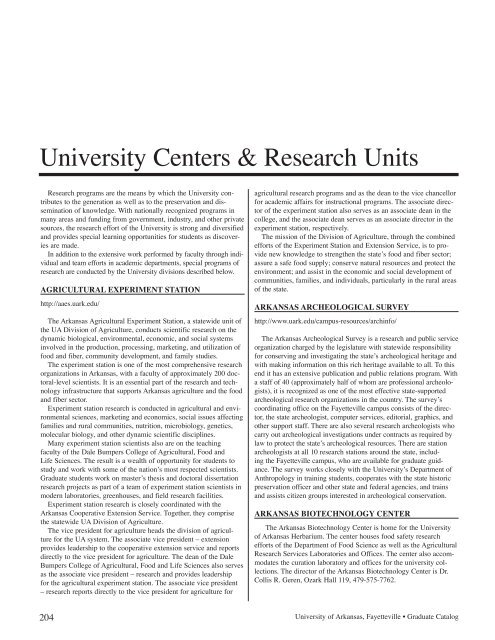Graduate School - Catalog of Studies - University of Arkansas
Graduate School - Catalog of Studies - University of Arkansas
Graduate School - Catalog of Studies - University of Arkansas
You also want an ePaper? Increase the reach of your titles
YUMPU automatically turns print PDFs into web optimized ePapers that Google loves.
<strong>University</strong> Centers & Research Units<br />
Research programs are the means by which the <strong>University</strong> contributes<br />
to the generation as well as to the preservation and dissemination<br />
<strong>of</strong> knowledge. With nationally recognized programs in<br />
many areas and funding from government, industry, and other private<br />
sources, the research effort <strong>of</strong> the <strong>University</strong> is strong and diversified<br />
and provides special learning opportunities for students as discoveries<br />
are made.<br />
In addition to the extensive work performed by faculty through individual<br />
and team efforts in academic departments, special programs <strong>of</strong><br />
research are conducted by the <strong>University</strong> divisions described below.<br />
AGRICULTURAL EXPERIMENT STATION<br />
http://aaes.uark.edu/<br />
The <strong>Arkansas</strong> Agricultural Experiment Station, a statewide unit <strong>of</strong><br />
the UA Division <strong>of</strong> Agriculture, conducts scientific research on the<br />
dynamic biological, environmental, economic, and social systems<br />
involved in the production, processing, marketing, and utilization <strong>of</strong><br />
food and fiber, community development, and family studies.<br />
The experiment station is one <strong>of</strong> the most comprehensive research<br />
organizations in <strong>Arkansas</strong>, with a faculty <strong>of</strong> approximately 200 doctoral-level<br />
scientists. It is an essential part <strong>of</strong> the research and technology<br />
infrastructure that supports <strong>Arkansas</strong> agriculture and the food<br />
and fiber sector.<br />
Experiment station research is conducted in agricultural and environmental<br />
sciences, marketing and economics, social issues affecting<br />
families and rural communities, nutrition, microbiology, genetics,<br />
molecular biology, and other dynamic scientific disciplines.<br />
Many experiment station scientists also are on the teaching<br />
faculty <strong>of</strong> the Dale Bumpers College <strong>of</strong> Agricultural, Food and<br />
Life Sciences. The result is a wealth <strong>of</strong> opportunity for students to<br />
study and work with some <strong>of</strong> the nation’s most respected scientists.<br />
<strong>Graduate</strong> students work on master’s thesis and doctoral dissertation<br />
research projects as part <strong>of</strong> a team <strong>of</strong> experiment station scientists in<br />
modern laboratories, greenhouses, and field research facilities.<br />
Experiment station research is closely coordinated with the<br />
<strong>Arkansas</strong> Cooperative Extension Service. Together, they comprise<br />
the statewide UA Division <strong>of</strong> Agriculture.<br />
The vice president for agriculture heads the division <strong>of</strong> agriculture<br />
for the UA system. The associate vice president – extension<br />
provides leadership to the cooperative extension service and reports<br />
directly to the vice president for agriculture. The dean <strong>of</strong> the Dale<br />
Bumpers College <strong>of</strong> Agricultural, Food and Life Sciences also serves<br />
as the associate vice president – research and provides leadership<br />
for the agricultural experiment station. The associate vice president<br />
– research reports directly to the vice president for agriculture for<br />
agricultural research programs and as the dean to the vice chancellor<br />
for academic affairs for instructional programs. The associate director<br />
<strong>of</strong> the experiment station also serves as an associate dean in the<br />
college, and the associate dean serves as an associate director in the<br />
experiment station, respectively.<br />
The mission <strong>of</strong> the Division <strong>of</strong> Agriculture, through the combined<br />
efforts <strong>of</strong> the Experiment Station and Extension Service, is to provide<br />
new knowledge to strengthen the state’s food and fiber sector;<br />
assure a safe food supply; conserve natural resources and protect the<br />
environment; and assist in the economic and social development <strong>of</strong><br />
communities, families, and individuals, particularly in the rural areas<br />
<strong>of</strong> the state.<br />
ARKANSAS ARCHEOLOGICAL SURVEY<br />
http://www.uark.edu/campus-resources/archinfo/<br />
The <strong>Arkansas</strong> Archeological Survey is a research and public service<br />
organization charged by the legislature with statewide responsibility<br />
for conserving and investigating the state’s archeological heritage and<br />
with making information on this rich heritage available to all. To this<br />
end it has an extensive publication and public relations program. With<br />
a staff <strong>of</strong> 40 (approximately half <strong>of</strong> whom are pr<strong>of</strong>essional archeologists),<br />
it is recognized as one <strong>of</strong> the most effective state-supported<br />
archeological research organizations in the country. The survey’s<br />
coordinating <strong>of</strong>fice on the Fayetteville campus consists <strong>of</strong> the director,<br />
the state archeologist, computer services, editorial, graphics, and<br />
other support staff. There are also several research archeologists who<br />
carry out archeological investigations under contracts as required by<br />
law to protect the state’s archeological resources. There are station<br />
archeologists at all 10 research stations around the state, including<br />
the Fayetteville campus, who are available for graduate guidance.<br />
The survey works closely with the <strong>University</strong>’s Department <strong>of</strong><br />
Anthropology in training students, cooperates with the state historic<br />
preservation <strong>of</strong>ficer and other state and federal agencies, and trains<br />
and assists citizen groups interested in archeological conservation.<br />
ARKANSAS BIOTECHNOLOGY CENTER<br />
The <strong>Arkansas</strong> Biotechnology Center is home for the <strong>University</strong><br />
<strong>of</strong> <strong>Arkansas</strong> Herbarium. The center houses food safety research<br />
efforts <strong>of</strong> the Department <strong>of</strong> Food Science as well as the Agricultural<br />
Research Services Laboratories and Offices. The center also accommodates<br />
the curation laboratory and <strong>of</strong>fices for the university collections.<br />
The director <strong>of</strong> the <strong>Arkansas</strong> Biotechnology Center is Dr.<br />
Collis R. Geren, Ozark Hall 119, 479-575-7762.<br />
204<br />
<strong>University</strong> <strong>of</strong> <strong>Arkansas</strong>, Fayetteville • <strong>Graduate</strong> <strong>Catalog</strong>












